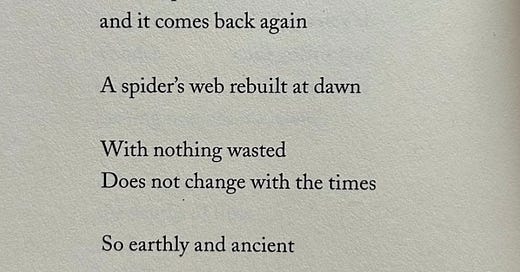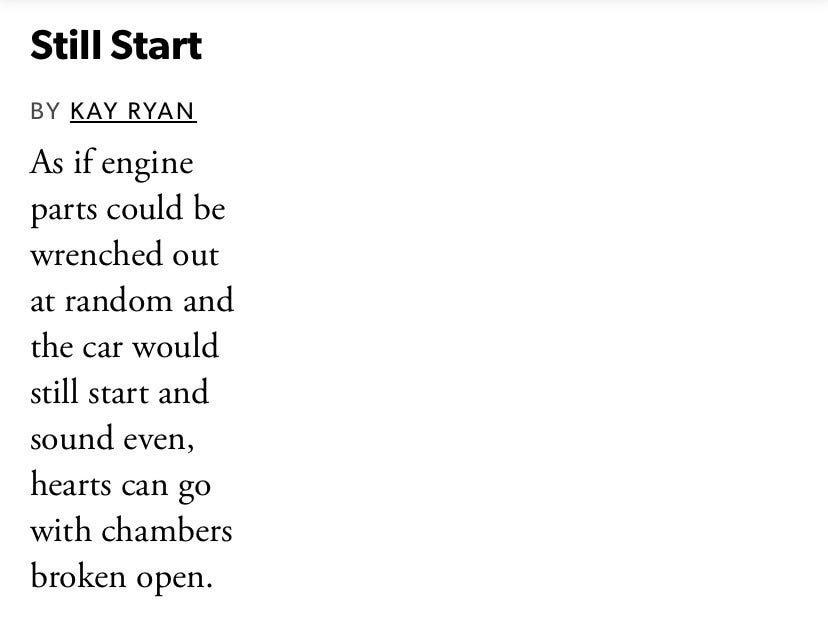Tiny Poem Tuesday, Noticing
Let's gather and read some poems about noticing the mundane with a new perspective.
Good morning everyone and happy tiny poem Tuesday! I am sorry for the short hiatus between gatherings—I just needed a little time off for myself. Thank you for your grace and patience. I am back now, and I am so excited to spend my morning reading some tiny poems with you all.
The theme for these tiny poems is Noticing (yes, this is vague, but this is my newsletter so I can do whatever I want!). The inspiration for this post came from an excerpt of Anne Sexton’s poem, “Small Wire:”
As it has been said: Love and a cough cannot be concealed. Even a small cough. Even a small love.
No matter how hard you try, your cough is heard in a quiet room, your small love is felt. Sexton takes this ordinary experience and gives it a new meaning—coughs are like love. I have collected three poems that are all short ruminations on the ordinary—an engine, crying in a bathroom stall, a spider’s web. Each poem presents these images and takes meaning from them. These poets show that there is poetry in everything around us, and that we always have the opportunity to look at life in a new way, with a new lens.
Poet Pam Rehm begins this poem with action–”tear it apart.” As the readers, we have no idea what she is talking about, what we should be ripping apart, but this opening is compelling. Are we ripping apart the paper this poem is on? Our habits (re: the title)? I trust Rehm, so I carry on. “Tear it apart / and it comes back again.” In this poem, Rehm is referring to spider web–you tear it down one evening, and the next morning it is back “with nothing wasted.” How many times have you torn down a spider web only to find it rebuilt the next day? It’s a cycle. Rehm describes the cycle as “so earthly and ancient,”—the humans destroying, the critters reconstructing.
I tear down spider webs in the summer, feeling the sticky threads on my fingers and hoping the spider moves on. Yet, I wake up the next morning, and it’s always there again. Rehm calls this the “myth of morning,” the myth being that the morning restarts our cycle every day, giving us a new start. Instead, Rehm suggests that “the morning makes us.” It’s in these renewals, the beginnings of a new day, that we remember ourselves–creatures that tear down webs, creatures that drink coffee in the morning and call our parents on the weekends. Rehm takes something simple, the silky threads that make a spider’s web, and extrapolates it into a truth of human nature–we are remade with every day, and that’s what makes us human.
Kim Addonizio begins this poem in the title. While this poem is not necessarily a letter “to the woman crying uncontrollably in the next stall,” it is an address to everyone who has ever been that person (or like that person). We glean this from the first line: “if you ever woke in your dress at 4 A.M.…” Most of this poem is a list of experiences, little heartbreaks and hard times we experience. My favorite is “stood miserably on a beach / seaweed clinging to your ankles.”
Addonizio doesn’t use punctuation in this poem (until the end), allowing every moment to bleed into the next. She makes a collage of images—bad haircuts, bleeding on a back seat, singing in the shower, breaking your heart because why not? Even if you haven’t experienced something in this poem, the listing makes it easy for the reader to glean the sentiments of the experiences and fill in their own—maybe you’ve stared in an empty open fridge, scrubbed dropped ice cream off the floor, called someone you know would not pick up. We all have our moments, and Addonizio realizes this. And in reply, she answers: “listen I love you joy is coming.” Let it come, loves.
To close out Tiny Poem Tuesday, we have “Still Start” by Kay Ryan. The metaphor here is pretty clear—Ryan compares the engine of a car (or motorcycle, or lawnmower, or spaceship, we don’t know!) to a person’s heart. Both the heart and the engine are centers of functionality—without them, the body doesn’t work.
Ryan begins this poem with a hypothetical: “As if engine / parts could be / wrenched out.” I love that Ryan uses “wrenched” here—there is so much violence in this image, randomly pulling out pieces of a machine. Of course, reader, you would not expect the engine to work, to “still start” (roll credits) and to sound even. So then why, when your heart breaks, do you expect it to work?
This is a great example of what poetry does. You could call your friend after a break up, after a loss of a loved one, after a hard day, and you could tell them that your heart is broken. This poem takes this sentiment and allows you to see it in a new life. Ryan compares heartbreak to a broken engine, one where you wrenched out the pieces and hoped it would still run. You’re left with a broken heart, where the chambers are broken open, no longer beating.
What did I love most about this poem? I think I just needed it this week. A reminder that when you pull all the pieces out, when you run on fumes, and you break everything that makes you run, you can’t expect to still start.
If you enjoyed these poems… this is where you can read more from Pam Rehm, Kim Addonizio, and Kay Ryan.
If you want to read more poems that notice the little things… read a some of “Song of Myself” by Walt Whitman (preview: he describes grass as God’s handkerchief).
If you want to try writing poetry… think of something you do or see every day. Write about it, think about it like a child, ask questions. What does it remind you of? Let’s write about it!








